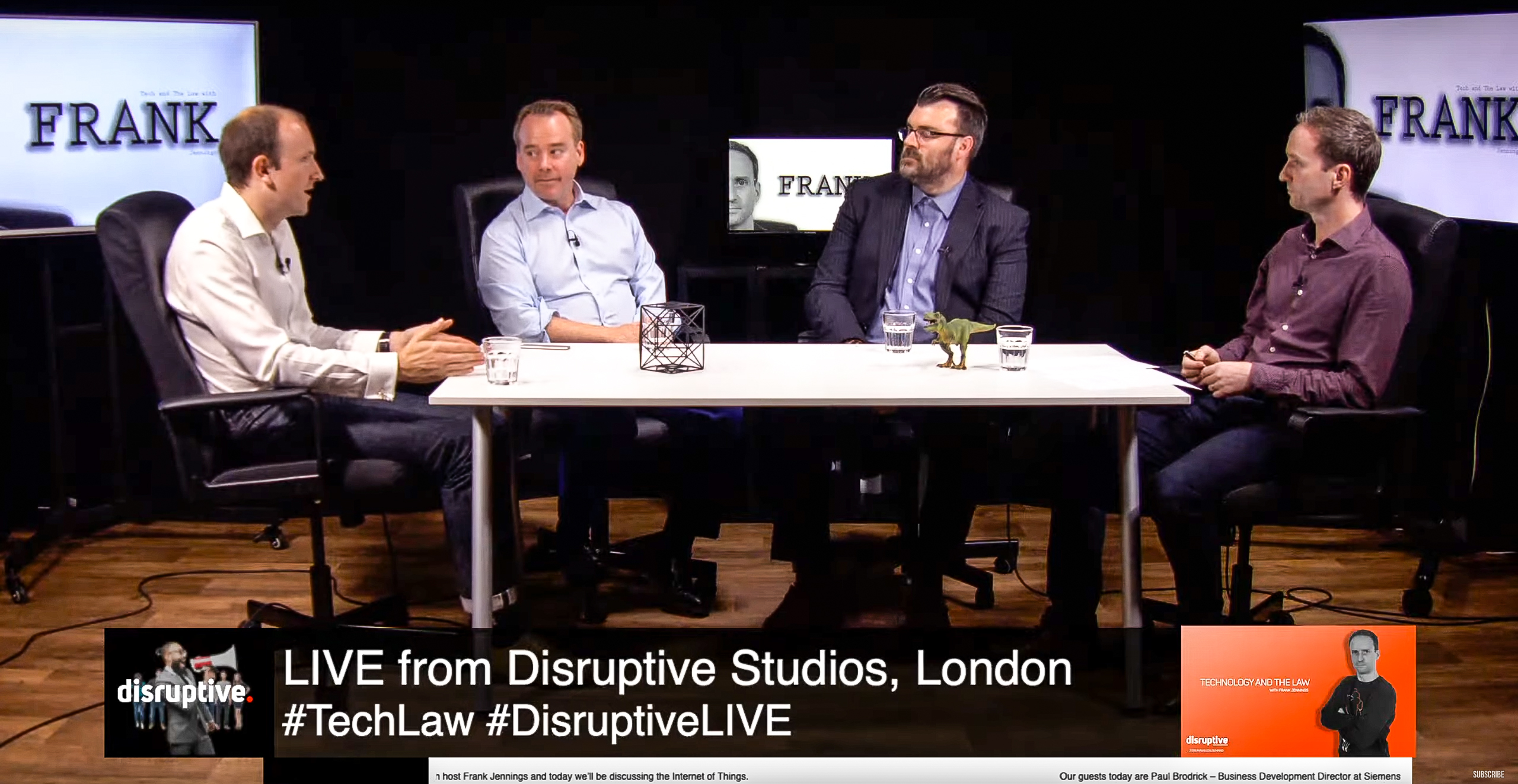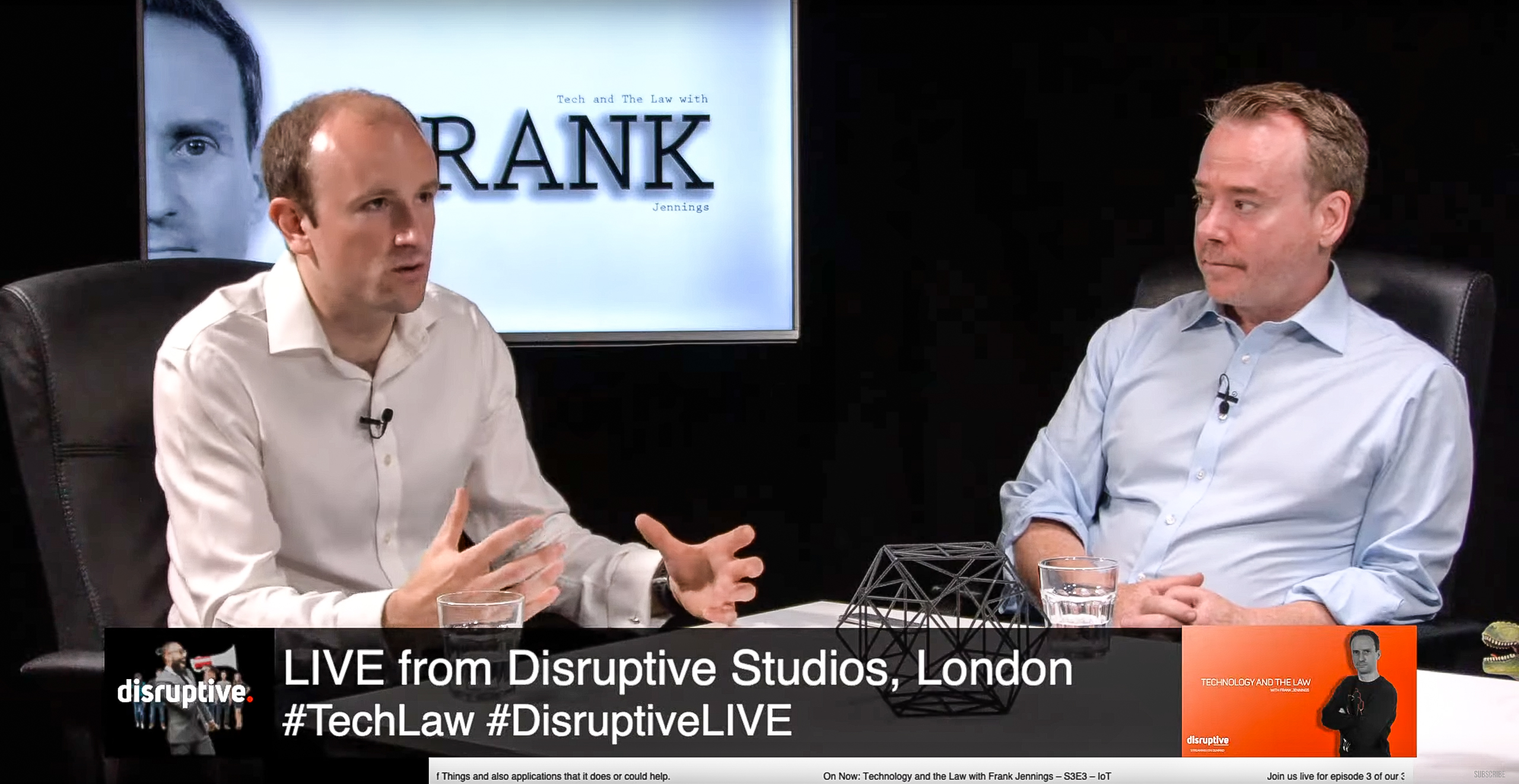What is the Internet of things (IoT), why does it matter and what are its implications? Mark Curling, Klevio’s co-founder and COO, sat down for a discussion on IoT with Technology and Law host Frank Jennings, aka “the cloud lawyer,” along with Paul Brodrick, business development director at Siemens Smart Infrastructure and Oliver Oram, CEO and founder of Chainvine, the blockchain open ledger technology platform.
We’ve watched the show for you and picked out five key takeaways.

Internet of things means a hundred different things to a hundred different people
IoT is a phrase used to refer to the extension of internet connectivity into physical devices and everyday objects, with the capacity to collect data. Some things have always been connected to the internet and you can expect them to be connected remotely. Originally, it was just a desktop computer that was connected to the internet, then it was tablets and mobiles and now it can be fridges and other home products that control things like heating and lighting.
Indeed, internet connectivity is now being harnessed for application to any number of everyday household items. Oliver Oram adds that devices aren’t smart but they are giving you intelligence, telling you what they are, what they’re doing now and how they’re acting.
And as Mark Curling explains, the limits of IoT’s application are beginning to map onto the limits of people’s creativity. It’s now easier than ever to source suitable and affordable hardware that can serve as a data collection point. Suddenly everyone can build them – all that’s required is an idea, creativity, and the will to carry it out.
IoT helps people solve problems
Why do we need everything to be connected? IoT helps people solve problems. In Klevio’s case this means solving lots of problems that you’d be unable to do with physical keys. For example, unlocking doors remotely when you’re on the other side of the world. Paul Brodrick points out that IoT is all about making people’s lives better. He highlights social care as an illustration of this: the NHS recently announced that Amazon’s Alexa will be used to help diagnose health problems.
IoT is used – and has the potential to be used – across numerous industries: from mass production and logistics to smart homes and agriculture (aka “agrotech”). But, at base, every application of IoT shares a common goal: to collect data and to use that data to make better decisions.
IoT has an impact on jobs – but not necessarily a negative one
When considering the ethical side of IoT and in particular its impact on work, the panelists noted how new technologies typically create jobs that didn’t exist before. For example, social media managers and industrial data scientists are roles that have emerged directly out of the tech revolution. In short, a shift in the job market is taking place, and although some positions will inevitably become obsolete, new jobs will be created too.
The sensors that are being used in IoT application (like proximity or smoke sensors) and data sets that are being gathered with the emergence of IoT can help create new products and move people around different jobs in a way that doesn’t necessarily mean reducing headcount. This also reflects the way companies are hiring now, because they don’t necessarily hire people who already have an exact skillset. Instead, the best candidates are the ones who have the ability to learn. Skills that people have now might well be redundant in 5 years time, adds Mark Curling.

Security: companies need to take responsibility to succeed
As industries adjust to a digital world, security becomes a higher challenge on, not just an industrial, but a consumer scale. That means creating products for consumers that are reliably secure.
Mark Curling says companies need to take responsibility to succeed, otherwise they won’t gain any traction. For Klevio, security concerns are particularly pertinent. The company deals with the front door of people’s home which, for many, is their most valuable asset, and the one you’re emotionally tied to because all of your belongings and valuables are usually inside.
Moreover, questions about security are not trivial, and security issues encompass a range of areas, such as hacking (digital security), physical security of the front door, and regulatory security as insurance. But it also comes down to educating people about how to use the technology and about some basic security processes.
Liability: it’s incumbent on those offering services to educate people
If something goes wrong with internet enabled devices, where does the liability fall? The IoT sector is wide and ever-growing. Frank Jennings says that the IoT sector and technology in general develops so fast that legislation will always be playing catch-up with technology.
When it comes to security, commercial businesses and consumers are very different. A discussion about security in relation to commercial businesses is pretty straightforward, but consumers perceive security in a different way. They are typically less interested in the technical aspects of a product and more in its convenience and efficiency. In short, they want to be comfortable using it, safe in the knowledge that they trust it.
Because the perception of security will usually lead consumers over the actual risk, companies are compelled to overprotect. Klevio works with specific insurance companies to make sure consumers are adequately covered. No company should neglect communicating their security measures and standards to their customers. Quite simply, failure to do so is inimical to fostering consumer confidence in the quality and security of a product.
Although Paul Brodrick mentions that users ought to be smart with how they use their IoT products, he agrees that this doesn’t nullify the obligation on people providing these products to educate consumers. In short, so long as data is being shared, consumers should both be aware of what is being shared, and have the power to control it.
Want to watch the show too? You can find it here: